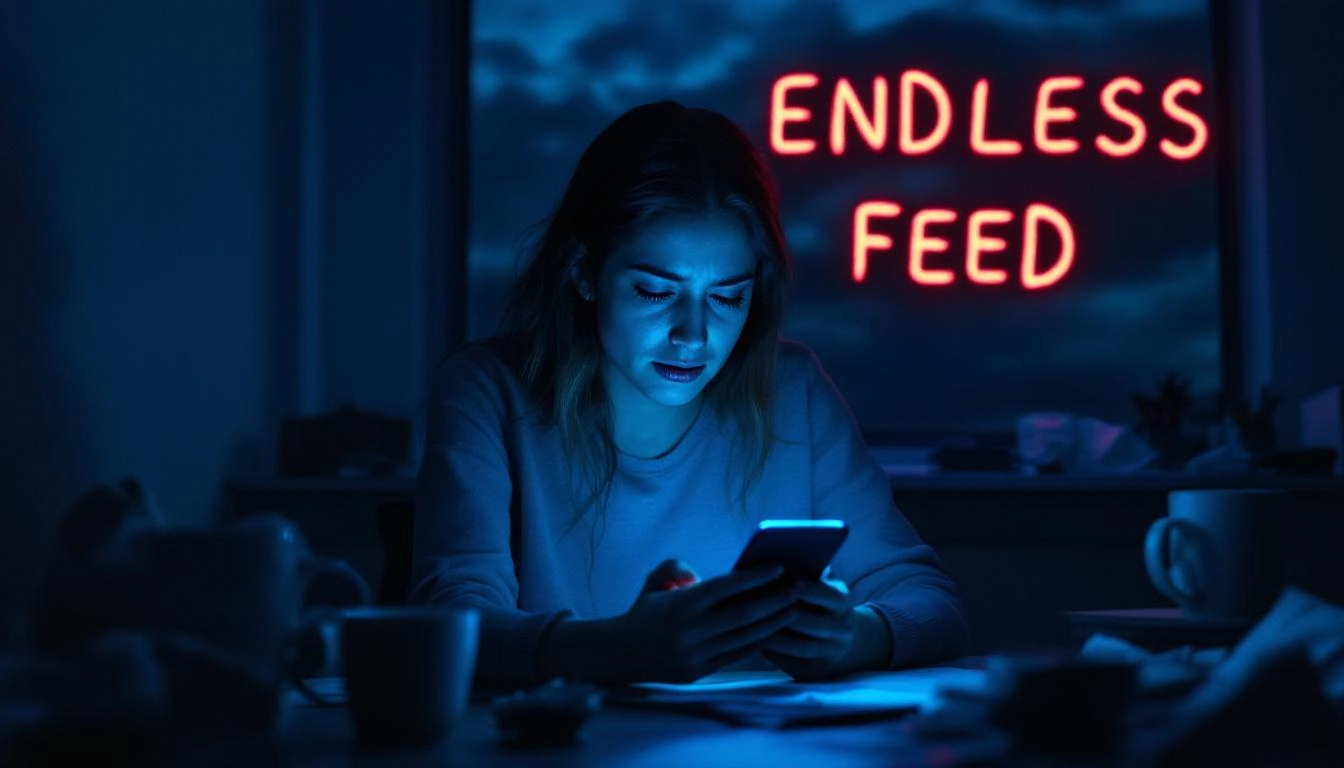It starts innocently—you pick up your phone to check the news before bed. Suddenly, you’re scrolling through endless headlines of disasters, crises, and negativity. Before you know it, an hour has passed, and your mind feels heavier than before. This seemingly harmless habit has a name: doomscrolling. Today, people everywhere are recognizing the psychological impact of doomscrolling and how it can take a toll on our mental well-being. More than wasted time, doomscrolling influences the way your brain processes information, heightens anxiety, and can change the way you view the world. Let’s explore why this happens and what you can do about it.
Table of Contents
- What is Doomscrolling? Defining the Habit
- The Psychological Impact of Doomscrolling on Mental Health
- Why Our Brains are Wired for Doomscrolling
- Long-Term Consequences of Doomscrolling
- Healthy Alternatives and Coping Strategies
- FAQs on the Psychological Impact of Doomscrolling
- Conclusion
What is Doomscrolling? Defining the Habit
Doomscrolling refers to the compulsive act of consuming endless negative news or distressing updates online. While staying informed is healthy, this excessive habit can be mentally exhausting.
Origins of the Term “Doomscrolling”
The term gained prominence during the COVID-19 pandemic when people increasingly reported feeling glued to grim news feeds. It reflects the mix of “doom” (negative content) and “scrolling” (the endless action of consuming it).
How Social Media Feeds Negative Content Consumption
Platforms like Twitter, TikTok, and Facebook thrive on algorithms designed to hold your attention. Unfortunately, bad news spreads faster, meaning your feed often becomes a cascade of negativity. Read more on social media and mental health.
The Rise of Doomscrolling During Global Crises
Political unrest, climate concerns, and health emergencies all spike online content consumption. During such events, doomscrolling gives us a sense of staying alert but ultimately leaves us drained. For more background from experts, see the American Psychological Association.

The Psychological Impact of Doomscrolling on Mental Health
The real harm lies not in occasional scrolling, but in its repeated impact on our mental state. The psychology of doomscrolling reveals how obsessive news consumption can worsen several mental health issues.
Increased Anxiety and Stress Levels
Every headline about uncertainty or danger triggers your brain’s stress response. While it’s natural to worry about the world, constant exposure elevates cortisol levels, making anxiety harder to manage. Learn more about managing anxiety online.
Effects on Sleep and Cognitive Overload
Late-night scrolling exposes you to blue light and unsettling news, disrupting sleep cycles. Your brain struggles to process emotional information, leading to restlessness and fatigue.
Links Between Doomscrolling and Depression
Research from the National Institute of Mental Health highlights that prolonged exposure to negative media is linked to depressive symptoms. The more you focus on negativity, the harder it is to maintain optimism about the future.
Why Our Brains are Wired for Doomscrolling
Understanding why doomscrolling is so addictive is essential. Our brains are naturally biased toward noticing dangers, but modern technology amplifies this survival instinct.
The Psychology of Negative Bias
Humans are wired to prioritize bad news because, historically, survival depended on recognizing threats. This bias makes doomscrolling feel strangely logical, even when it’s harming your well-being.
Dopamine Loops and Instant Reward Mechanisms
Every scroll brings something new. That unpredictability triggers dopamine—a chemical associated with reward pathways—making doomscrolling compulsive. Discover more in our article on digital addiction and brain chemistry.
Fear of Missing Out (FOMO) and Constant Connectivity
The fear of being uninformed pushes us to refresh feeds constantly. As Harvard Business Review reports, digital FOMO keeps people tethered to their devices, even when it negatively impacts mental clarity.
Long-Term Consequences of Doomscrolling
While short-term stress is concerning, the long-term damage from constant doomscrolling is even deeper.
Chronic Stress and Mental Fatigue
Prolonged exposure to stress-inducing content keeps the body in a fight-or-flight state. Over time, this wreaks havoc on your immune system and overall mental health. Learn more in the cost of stress on mental health.
Impacts on Productivity and Focus
Because doomscrolling floods the brain with information, it becomes difficult to concentrate on work, studies, or personal goals. This leads to procrastination and declining performance.
Social Isolation and Perception of the World
When negativity overshadows your worldview, you may withdraw socially. According to the World Health Organization, chronic isolation is a significant risk factor for mental illness.
Healthy Alternatives and Coping Strategies
The good news? Doomscrolling doesn’t have to control you. By adopting healthier habits, you can reduce its impact on your mental health.
Setting Digital Boundaries and Screen Time Limits
Set app timers, disable notifications, or create “device-free zones” to prevent endless scrolling before bed.
Practicing Mindfulness and Conscious Media Consumption
Mindfulness helps anchor your thoughts in the present. Instead of automatically opening Twitter, pause and choose what content to engage with. Explore more in mindfulness practices for mental health.
Replacing Doomscrolling with Positive Activities
Journaling, listening to uplifting podcasts, or exercising can redirect your energy. For professional advice, see Mayo Clinic’s stress management resources.
Frequently Asked Questions
What are the most common mental health effects of doomscrolling?
The psychological impact of doomscrolling includes heightened anxiety, poor sleep, fatigue, and increased feelings of depression.
How can I tell if I’m doomscrolling too much?
If checking the news leaves you more anxious than informed, or if you lose hours scrolling unconsciously, you may be doomscrolling excessively.
What strategies can reduce the psychological impact of doomscrolling?
Effective strategies include limiting online time, practicing mindfulness, curating positive content, and unplugging during meals or at bedtime.
Is doomscrolling always harmful, or can it sometimes be helpful?
Staying informed is important, but information overload dilutes its value. The danger lies in excess and lack of balance.
How does doomscrolling affect sleep?
Exposure to unsettling news and blue light before bedtime overstimulates the brain and delays restful sleep cycles.
Conclusion
The psychological impact of doomscrolling goes far beyond wasted hours on a screen. It disrupts sleep, heightens anxiety, and clouds how you experience the world. But awareness is the first step. By setting boundaries, practicing mindful media use, and prioritizing positive activities, you can reclaim your focus and safeguard your mental health. Remember, you have the power to curate your digital environment—choose wisely, and protect your mind from the endless scroll of negativity.


This is really interesting, You’re a very skilled blogger. I have joined your feed and look forward to seeking more of your fantastic post. Also, I have shared your web site in my social networks!